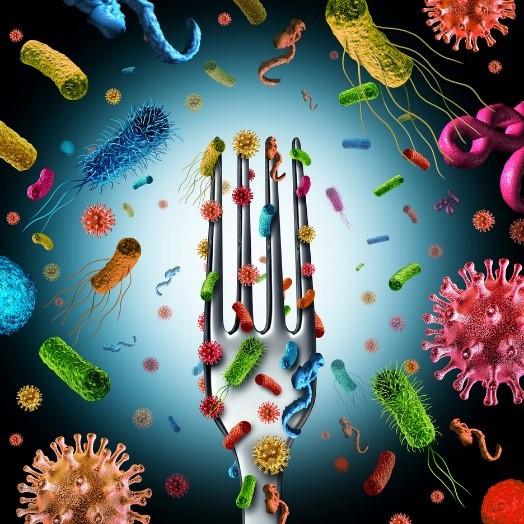Summer will soon be upon us with lots of backyard parties, barbecues, and picnics.
And unfortunately, foodborne illnesses too.
According to the CDC, each year about 1 in 6 Americans gets hit with a foodborne illness like E. coli, campylobacter or salmonella.
Foodborne illnesses are responsible for at least 130,000 hospitalizations and 3,000 deaths in the US annually, although experts believe those estimates are very low because of unreported cases.
Their numbers are growing
Illness-causing pathogens are now appearing more and more on fresh produce due in part to the global import network--there are now more "middle men" and a wide range of handling practices in the mix which open the door to more contamination.
But the biggest culprit continues to be meat, especially poultry. Experts estimate that nearly 75 percent of all commercial poultry has some form of contamination!
Hits you like a ton of bricks
Symptoms of foodborne illness usually start within 48 hours and include nausea, vomiting, cramping, and diarrhea. Fever and chills, bloody stools, dehydration and even nervous system damage may also follow.
Foodborne illness is tricky because you can't see the bacteria on the food, nor can you taste it most times…your first sign that something is wrong is when you’re rocketing to the bathroom.
Preventive measures
In addition to making sure that all meats and poultry are cooked properly, here are some ways that you can help prevent foodborne illness:
1) Wash thoroughly
It's essential to wash all fresh produce thoroughly, no matter where it’s from.
For greens, soak them in a cold water bath, then drain and hold them under running water for a moment.
For other fruits and vegetables the following general rules apply:
- Berries: Rinse in cold water in a strainer.
- Fruits and vegetables where you're eating the skin (like grapes, green and yellow squash and tomatoes): Wash and rinse thoroughly. Produce washes are helpful, but mild dish soap works fine.
- Fruits and vegetables that you peel (including carrots and parsnips): Peel then rinse.
- Fruits and vegetables that you trim (like green beans, asparagus, and broccoli): Rinse thoroughly in cold water in a strainer before trimming AND after.
- Fruits and vegetables that you cut through the skin (like melons, citrus fruit or avocados): Wash and rinse thoroughly BEFORE cutting. Bacteria can adhere to the skin and be transferred to the flesh when you cut it open.
2) Check dates
Check expiration dates on meats and eggs before purchasing--just because an item is on the store shelf does not mean it's fresh!
3) Watch juices
Don't let juices or drippings from raw meat, poultry, shellfish or eggs come into contact with other foods.
Wash cutting boards, knives and other utensils in hot soapy water after handling raw meat, poultry, seafood or eggs.
4) Hot ‘n cold
Keep hot food hot (temperatures between 160 degrees to 212 degrees Fahrenheit destroy most bacteria) and cold food cold (40 degrees Fahrenheit).
Promptly refrigerate leftovers. Leftovers should not stay out of the refrigerator for longer than two hours.
5) Keep towels clean
Wash dishcloths and kitchen towels regularly and grab a fresh one as soon as the one you're using starts to feel damp. Damp cloths are the perfect place for bacteria to breed.
6) Wash yourself too!
Proper hand-washing can eliminate as many as half of all cases of food poisoning, and can even significantly reduce the spread of the common cold and flu.
Your body's two defenses
Your body was designed with two natural defenses against food poisoning built right in:
1- The acid in your stomach destroys many disease-causing pathogens
2- The friendly flora in your intestines can inhibit the growth of many foodborne pathogens, including Salmonella, Shigella, Enterococcus faecalis and E. coli
The problem is many people are lacking the protection of their stomach acid because they take acid reducers, and still others have practically obliterated their friendly gut flora with medications, sugars, refined carbs and sodas!
So to ensure your body’s defenses can protect you, you need to make sure they are able to work like they should.
Here’s how:
1- Make the stomach’s job easier
To naturally curb heartburn and acid reflux, make your meals simpler and easier for your body to digest in the first place.
Avoid eating proteins and starches together in the same meal. Instead pair meats OR starches with vegetables and salads. These combinations are much easier for your body to tackle, and make it far less likely that you will suffer heartburn and need acid reducers, to begin with.
Acid reflux and indigestion can also be the result of low digestive enzyme output. This may especially apply to you if you are elderly, use acid reducers or have had gallbladder or gastric surgery. If enzymes are an issue, Digestizol Max’s full-spectrum blend of 15 plant-based enzymes can help pick up the slack and support better digestion.
2- Support your friendly gut flora
The best way to ensure a healthy, robust population of protective beneficial bacteria in your gut is to take a probiotic supplement like Super Shield multi-strain probiotic formula.
Even if you have a stellar diet, many other factors like stress, lacking sleep, medications, tap water and toxins in the environment can harm your intestinal flora…so probiotic supplementation is truly the best way to support a consistent, healthy flora balance.
Enjoy the summer barbecue season—safely and free of food borne illness!
To your health,
Sherry Brescia










